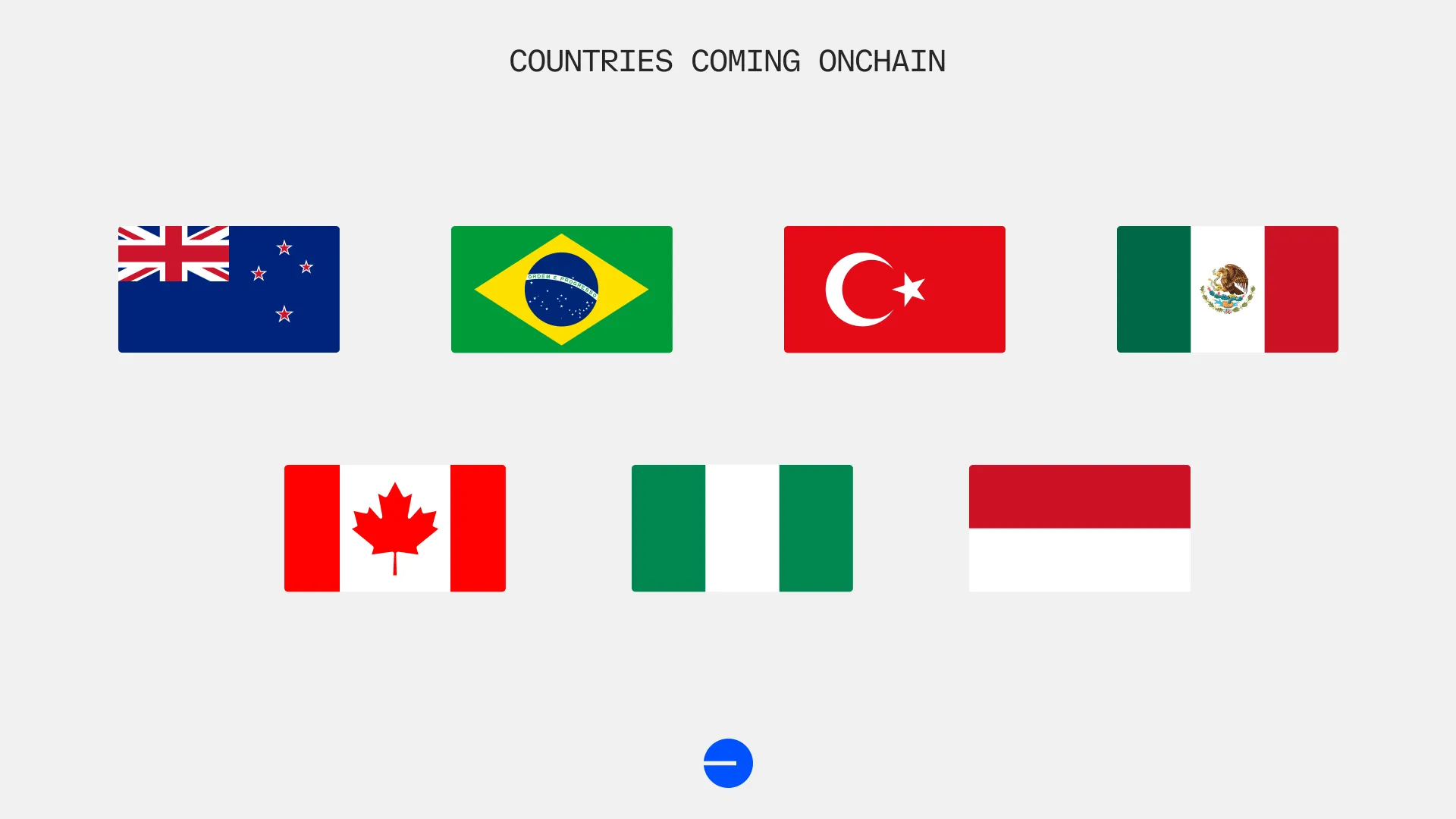Hey, have you heard about Base’s exciting move to bring the world “onchain”? On March 20, 2025, Base shared a post on X that caught a lot of attention, especially if you’re into crypto or global finance. They’re working on something big: creating stablecoins for countries like New Zealand, Brazil, Turkey, Mexico, Canada, Nigeria, and Indonesia. These stablecoins are digital currencies tied to each country’s local money—like the New Zealand Dollar (NZD) or Brazilian Real (BRL)—and they’re designed to run on blockchain technology. Let’s break it down in simple terms and see why this matters.
What’s the Big Idea?
The post includes a cool image showing the flags of the seven countries mentioned, along with the text “Countries Coming Onchain.” Here’s what it looks like:
Base explains that these stablecoins will help solve some big problems for these countries. Stablecoins are cryptocurrencies designed to keep a steady value, usually pegged to something stable like a regular currency (e.g., the U.S. dollar) or even gold. In this case, they’re pegged to local currencies to make international trade and payments easier, cheaper, and faster.
Here’s why each country is getting in on this:
- New Zealand (@easycrypto): Their timezone makes it tough to do business globally in real time. A 24/7 NZD stablecoin lets businesses trade anytime, anywhere.
- Brazil (@BrzToken): High forex fees and a “walled-off” economy make global trade pricey. An onchain Brazilian Real (BRL) cuts those costs.
- Turkey (@BiLira_Kripto): Moving Turkish Lira digitally is slow and expensive. The TRYB stablecoin speeds things up with instant, round-the-clock settlements.
- Mexico (@brale_xyz): Many people in Mexico don’t have bank accounts, and remittances (money sent home by workers abroad) come with high fees. An onchain Mexican Peso (MXN) lowers those costs and opens up financial access.
- Canada (@Paytrie): Canada’s real-time payments system, Interac, is bank-controlled. An onchain Canadian Dollar (CAD) lets anyone use it freely, no permission needed.
- Nigeria (@ngnc_mc and @cngn_co): Nigeria’s financial system is slow, costly, and lacks liquidity. A regulated onchain Nigerian Naira (NGN) offers instant transactions.
- Indonesia (@idrx_co): Indonesians lose about $720 million a year to remittance fees. An onchain Indonesian Rupiah (IDR) reduces fees, speeds up payments, and expands financial opportunities.
Base’s goal? To create a global economy where everyone can participate, no matter where they are. By bringing local currencies onto the blockchain, they’re making it easier for businesses and people to trade across borders without the usual hassles like high fees or slow processing times.
Why Does This Matter?
This initiative ties into a bigger trend in the crypto world. Stablecoins are gaining traction because they bridge the gap between volatile cryptocurrencies (like Bitcoin) and the stability of traditional money. They’re especially useful for international trade, where traditional banking systems can be slow and expensive. According to Investopedia, stablecoins are “cryptocurrencies whose value is pegged to another currency, commodity, or financial instrument,” making them more reliable for everyday use.
Plus, this aligns with recent developments in the U.S. On March 7, 2025, President Donald Trump signed an executive order to create a Strategic Bitcoin Reserve and a U.S. Digital Asset Stockpile, using cryptocurrencies the government already owns via Reuters. This shows governments are starting to see crypto—and stablecoins—as serious players in the global financial system. Base’s project could be a stepping stone toward that future, especially if it sets a standard for how countries can use blockchain for their currencies.
The Challenges Ahead
Of course, it’s not all smooth sailing. Some folks on X, like @MidasDaos, pointed out that while this is a cool idea, it won’t fully replace traditional systems unless there’s a global standard or agreement. Stablecoins might just coexist with the old way of doing things if there’s no clear path to unify them. And there’s always the question of regulation—governments might want control over digital currencies to prevent things like money laundering or tax evasion.
But for now, Base’s plan is a big step toward making finance more accessible and efficient. It’s exciting to think about a world where sending money across borders is as easy as sending a text message!
What’s Next?
If you’re into crypto or just curious about how money works, keep an eye on Base and these projects. They’re partnering with companies like Easy Crypto, BrzToken, and others to make this happen. You can follow the conversation on X, where people are already buzzing about how this could change global trade and finance.
Whether you’re in New Zealand, Nigeria, or anywhere else, this could mean cheaper, faster ways to handle your money. It’s a bold vision, and I’m excited to see where it goes in 2025 and beyond!




